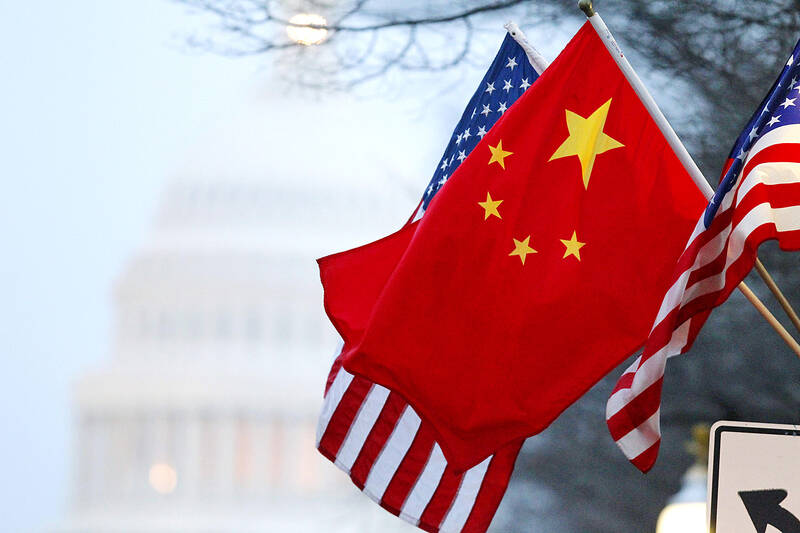The US being neutral on cross-Taiwan Strait issues is more likely to trigger a war it has long hoped to avoid, Global Taiwan Institute and American Enterprise Institute (AEI) research fellow Michael Mazza said.
Washington accepting Beijing’s coercion of Taiwan while being complicit in Taiwan’s international isolation “may ultimately make war more likely,” Mazza said in an article published in the National Review on Friday.
The remark was a response to an article by Oriana Skylar Mastro, Mazza’s colleague at the AEI, published by the New York Times, in which she urged the US to “restore” a “delicate balance of deterrence and reassurance” to avoid war with China over Taiwan.

Photo: Reuters
Mazza said Mastro’s proposal entailed that the US “stand aside” while Beijing is attempting to isolate Taiwan by bullying and pressuring its diplomatic allies.
Calling on Washington to abandon attempts to create international space for Taipei and US lawmakers to refrain from visiting Taiwan “would leave Beijing emboldened” and Taipei isolated, he said.
The approach “would greenlight coercion and make a violent outcome all the more likely,” he added.
Both authors agreed that it was Beijing’s military coercion and other behaviors that are posing threats to the “status quo,” but they differed in its motivations.
While Mastro said that China stepped up military pressure on Taiwan in response to President Tsai Ing-wen (蔡英文) of the “independence-leaning” Democratic Progressive Party (DPP) being elected in 2016, Mazza considered the change in Taiwanese public opinion as the “larger context” in play.
“Three decades of public opinion polling have shown Taiwan’s people to be increasingly supportive of at least de facto independence and increasingly opposed to unification” and increasingly identifying themselves as Taiwanese rather than Chinese or as both Taiwanese and Chinese, he said.
Beijing’s pressure campaign against Taiwan did not begin after Tsai’s election victory, but during the latter years of former president Ma Ying-jeou’s (馬英九) term in office, “when he was forced to back away from his attempt to draw closer to Beijing,” he said.
By the 2016 presidential election, China became increasingly aware that “peaceful, uncoerced unification was a pipe dream,” as its carrot-and-stick approach failed to reverse “the obvious and enduring fact of Taiwan’s separateness from the People’s Republic [People’s Republic of China, PRC],” which left China with coercion and meddling, he said.
At the same time, the balance of military power between China and Taiwan had been shifting toward Beijing, which now has advantages in air and naval power, and might launch a successful amphibious invasion of Taiwan in a few years “even with American intervention,” he said.
Mazza’s observation echoed a recently published US Department of Defense report, which said “the PRC’s multi-decade military modernization effort continues to widen the capability gap compared to Taiwan’s military.”
Taiwanese people’s sentiments in favor of independence and China’s growing military strength “make it increasingly likely that Beijing will ultimately opt for force. American reassurances, or American provocations, are a secondary consideration,” Mazza said.
“But even secondary considerations can be impactful,” he said, arguing against Mastro’s suggested approach that the US could reach a high-level agreement with China “in which Washington reiterates its longstanding political neutrality and China commits to dialing back its military threats.”
The US “has never maintained a position of true ‘political neutrality,’” but “has long thrown its weight behind Taiwan,” including the ongoing provision of arms to Taiwan based on the Taiwan Relations Act, he said.
Being politically neutral would essentially give China “a free hand” and “not a recipe for the peaceful resolution of disputes,” he said.

An essay competition jointly organized by a local writing society and a publisher affiliated with the Chinese Communist Party (CCP) might have contravened the Act Governing Relations Between the People of the Taiwan Area and the Mainland Area (臺灣地區與大陸地區人民關係條例), the Mainland Affairs Council (MAC) said on Thursday. “In this case, the partner organization is clearly an agency under the CCP’s Fujian Provincial Committee,” MAC Deputy Minister and spokesperson Liang Wen-chieh (梁文傑) said at a news briefing in Taipei. “It also involves bringing Taiwanese students to China with all-expenses-paid arrangements to attend award ceremonies and camps,” Liang said. Those two “characteristics” are typically sufficient

A magnitude 5.9 earthquake that struck about 33km off the coast of Hualien City was the "main shock" in a series of quakes in the area, with aftershocks expected over the next three days, the Central Weather Administration (CWA) said yesterday. Prior to the magnitude 5.9 quake shaking most of Taiwan at 6:53pm yesterday, six other earthquakes stronger than a magnitude of 4, starting with a magnitude 5.5 quake at 6:09pm, occurred in the area. CWA Seismological Center Director Wu Chien-fu (吳健富) confirmed that the quakes were all part of the same series and that the magnitude 5.5 temblor was

The brilliant blue waters, thick foliage and bucolic atmosphere on this seemingly idyllic archipelago deep in the Pacific Ocean belie the key role it now plays in a titanic geopolitical struggle. Palau is again on the front line as China, and the US and its allies prepare their forces in an intensifying contest for control over the Asia-Pacific region. The democratic nation of just 17,000 people hosts US-controlled airstrips and soon-to-be-completed radar installations that the US military describes as “critical” to monitoring vast swathes of water and airspace. It is also a key piece of the second island chain, a string of

The Central Weather Administration has issued a heat alert for southeastern Taiwan, warning of temperatures as high as 36°C today, while alerting some coastal areas of strong winds later in the day. Kaohsiung’s Neimen District (內門) and Pingtung County’s Neipu Township (內埔) are under an orange heat alert, which warns of temperatures as high as 36°C for three consecutive days, the CWA said, citing southwest winds. The heat would also extend to Tainan’s Nansi (楠西) and Yujing (玉井) districts, as well as Pingtung’s Gaoshu (高樹), Yanpu (鹽埔) and Majia (瑪家) townships, it said, forecasting highs of up to 36°C in those areas